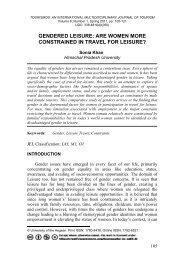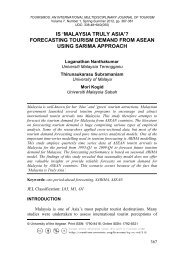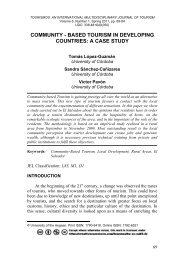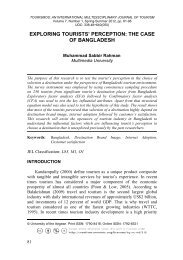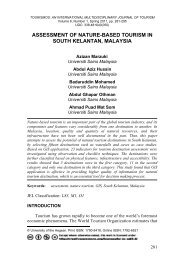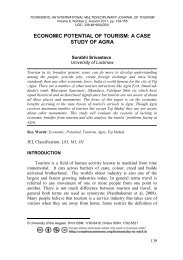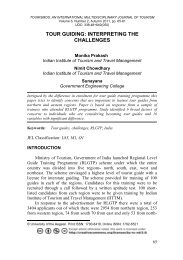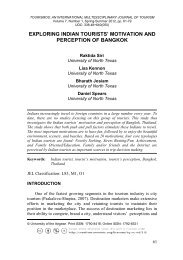TOURISMOS is an international, multi-disciplinary, refereed (peer ...
TOURISMOS is an international, multi-disciplinary, refereed (peer ...
TOURISMOS is an international, multi-disciplinary, refereed (peer ...
You also want an ePaper? Increase the reach of your titles
YUMPU automatically turns print PDFs into web optimized ePapers that Google loves.
Sonia Kh<strong>an</strong><br />
be said that though overall, in compar<strong>is</strong>on to men, women remain<br />
relatively more constrained by familial responsibilities that hinder their<br />
freedom for le<strong>is</strong>ure travel, it c<strong>an</strong>not be asserted that they are the<br />
d<strong>is</strong>adv<strong>an</strong>taged gender in le<strong>is</strong>ure. Hence it <strong>is</strong> interesting to take up research<br />
that c<strong>an</strong> investigate if the ch<strong>an</strong>ging status of genders has been in favor of<br />
women, especially for allowing personal le<strong>is</strong>ure opportunities.<br />
BACKGROUND<br />
Gender <strong>is</strong> understood differently across societies. Sociolog<strong>is</strong>ts, Social<br />
Psycholog<strong>is</strong>ts <strong>an</strong>d Tour<strong>is</strong>m Scholars have coined the concept of gender in<br />
different ways. From a socio cultural dimension, the me<strong>an</strong>ing of gender <strong>is</strong><br />
constructed by society <strong>an</strong>d gender <strong>is</strong> referred to as socially learned<br />
behavior <strong>an</strong>d expectations that are associated with the two sexes<br />
(Anderson, 1993:59; Henderson, 1994). Swain (1995) elaborates Gender<br />
to be a system of culturally constructed identities that are expressed in<br />
ideologies of masculinity <strong>an</strong>d femininity that interact with socially<br />
structured relationships in div<strong>is</strong>ion of labor <strong>an</strong>d le<strong>is</strong>ure, sexuality <strong>an</strong>d<br />
power between women <strong>an</strong>d men. Gender has also been investigated in<br />
terms of the individual (how men <strong>an</strong>d women behave, their beliefs <strong>an</strong>d<br />
attitudes, gender identity), in terms of social structure (gendered div<strong>is</strong>ions<br />
in the social activities or labor of men <strong>an</strong>d women), <strong>an</strong>d in terms of<br />
symbolic orders (gender symbol<strong>is</strong>m, how we think about ‘masculinity’<br />
<strong>an</strong>d ‘femininity’). (Dav<strong>is</strong>, 1991: 65).<br />
Therefore, a common underst<strong>an</strong>ding <strong>is</strong> that Gender refers to the roles<br />
<strong>an</strong>d responsibilities of men <strong>an</strong>d women that are created in our families,<br />
our societies <strong>an</strong>d our cultures. It includes the expectations held about the<br />
character<strong>is</strong>tics, aptitudes <strong>an</strong>d likely behaviors of both women <strong>an</strong>d men,<br />
where conforming to one’s gender role <strong>is</strong> understood to be ‘doing<br />
gender’, which ironically also leads to creation of differences between<br />
males <strong>an</strong>d females.<br />
Gender <strong>is</strong> closely related to power dynamics <strong>an</strong>d brings with it<br />
privileges or restrictions. Till now, in all spheres of life it has been<br />
understood that men have always enjoyed better position <strong>an</strong>d privileges in<br />
society, as compared to women. Lindsey (1994: 68), mentions in her<br />
study that as quoted by Miller <strong>an</strong>d Swift (1991), George Orwell might<br />
have put it th<strong>is</strong> way, ‘all men are equal but men are more equal th<strong>an</strong><br />
women’. While males are associated with power, females are identified as<br />
the ‘fairer or weaker sex.’ Gender then seems to be a hierarchical<br />
structure of opportunity <strong>an</strong>d oppression (Ferree, 1990). ‘Contemporary<br />
106



